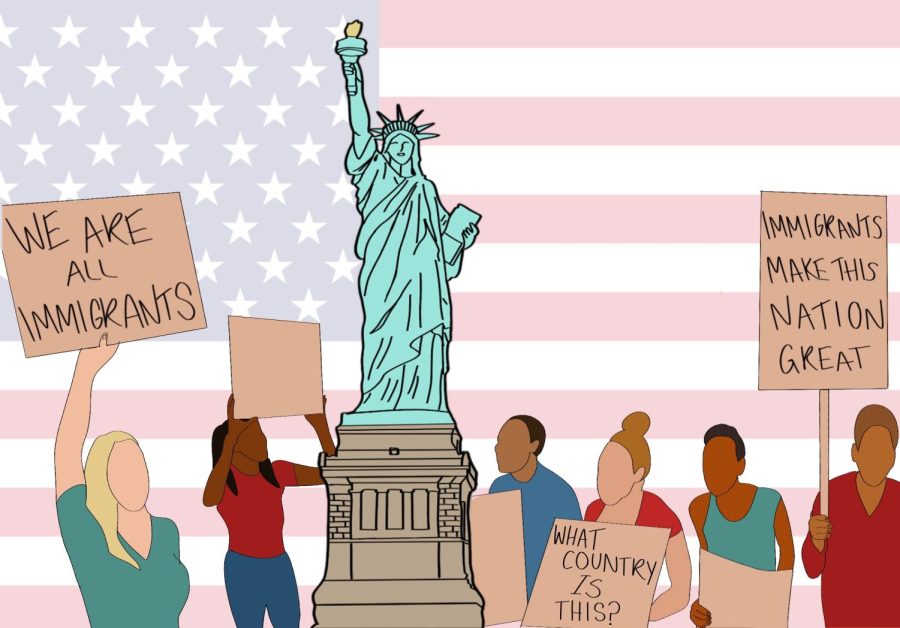Introduction: The Global Journey of Immigration
Immigration is a transformative journey, shaping lives, economies, and cultures worldwide. In 2024, the United Nations estimated that 281 million people lived outside their country of birth, a figure reflecting both opportunity and challenge. From navigating complex visa processes to adapting to unfamiliar cultural landscapes, immigrants face a unique set of hurdles and triumphs. This article explores the intricacies of immigration policies, the personal experiences of those who embark on this path, and practical advice for thriving in a new homeland. Through real stories, expert insights, and actionable tips, we aim to illuminate the human side of immigration while offering guidance for those considering or undergoing this life-changing process.
Visa Processes: The Gateway to a New Life
Securing a visa is often the first and most daunting step for immigrants. Each country has its own labyrinth of regulations, requirements, and timelines, making preparation critical. For instance, the United States offers over 185 visa types, ranging from temporary work permits like the H-1B to family-based green cards. In contrast, countries like Canada use a points-based system, prioritizing skills, education, and language proficiency.
Step-by-step guidance can make the process less overwhelming. Start by researching the specific visa category that aligns with your goals—be it work, study, or family reunification. Gather essential documents early, such as passports, educational certificates, and proof of financial stability. Many countries, like Australia, require health checks and police clearances, so plan for these time-consuming steps. Tip: Always double-check application deadlines and fees, as errors can delay processing by months.
“I spent six months preparing my Canadian Express Entry application,” says Priya Sharma, a 32-year-old software engineer from India. “The key was organizing my documents meticulously and practicing for the IELTS exam to boost my points score.”
Processing times vary widely. For example, UK Skilled Worker visas may take 3-8 weeks, while US family-based petitions can stretch over a year. Consulting an immigration lawyer or accredited agent can be invaluable, especially for complex cases involving appeals or humanitarian grounds. However, beware of scams—only work with licensed professionals verified by government authorities.
Common Visa Pitfalls and How to Avoid Them
Mistakes in visa applications are costly, both financially and emotionally. Incomplete forms, missing documents, or failing to meet eligibility criteria are common reasons for rejections. In 2023, the US Citizenship and Immigration Services (USCIS) reported a 15% rejection rate for H-1B visa petitions due to errors in filing. Pro tip: Use online checklists provided by embassies or immigration websites to ensure compliance.
Another hurdle is proving financial stability. Countries like Germany require proof of €11,904 in a blocked bank account for student visas. Applicants should also be prepared for interviews, where consular officers assess intent and credibility. Practicing clear, honest responses can make a difference.
Challenges Immigrants Face: Beyond the Paperwork
Once the visa is secured, the real challenges often begin. Immigrants frequently encounter language barriers, employment struggles, and social isolation. In countries like Sweden, where integration programs are robust, newcomers still report feeling disconnected due to cultural differences. A 2024 OECD study found that 30% of immigrants in developed nations faced difficulties finding jobs matching their qualifications, leading to underemployment.
Language proficiency is a major barrier. For example, non-English speakers in the UK or Australia may struggle with everyday tasks like opening a bank account or understanding workplace norms. Tip: Enroll in language classes before or immediately after arrival, and use apps like Duolingo or Rosetta Stone for practice.
“When I moved to Germany, I knew basic German, but ordering food or talking to my landlord was terrifying,” shares Ahmed Khalil, a Syrian refugee now working as a mechanic in Berlin. “Joining a local language tandem program helped me gain confidence and make friends.”
Discrimination is another hurdle. In some regions, immigrants face bias in housing or job markets. A 2025 report by the European Union Agency for Fundamental Rights noted that 24% of immigrants experienced workplace discrimination. Coping strategies include connecting with community organizations or legal aid services that advocate for immigrant rights.
Overcoming Financial and Emotional Struggles
Relocating is expensive. Moving costs, rent deposits, and initial living expenses can drain savings. For instance, settling in cities like Toronto or Sydney often requires $5,000-$10,000 upfront for housing and essentials. Budgeting and researching cost-of-living differences are crucial. Tip: Explore government subsidies or nonprofit programs that offer financial assistance to newcomers.
Emotionally, homesickness and isolation can take a toll. Building a support network—through cultural associations, religious groups, or online forums—can ease the transition. Many immigrants find solace in connecting with others who share their heritage or experiences.
Success Stories: Triumphs in New Lands
Despite the challenges, countless immigrants achieve remarkable success. Take Maria Gonzalez, who moved from Mexico to the US on a student visa in 2018. After earning a computer science degree, she landed a job at a Silicon Valley tech firm. “It wasn’t easy,” Maria says. “I worked part-time jobs to pay tuition and studied late nights. But seeing my name on a company badge made it worth it.”
In Australia, refugee entrepreneur Hassan Abdi turned his passion for Somali cuisine into a thriving catering business. Starting with a small food stall in Melbourne, he now employs six people.
“Australia gave me a chance to rebuild,” Hassan shares. “I learned to adapt my recipes to local tastes while staying true to my roots.”
These stories highlight resilience and adaptability. Success often stems from leveraging skills, seeking mentorship, and embracing opportunities like vocational training or entrepreneurship programs. Tip: Look for local incubators or small business grants tailored for immigrants.
Cultural Integration: Blending In While Staying True
Cultural adaptation is a delicate balance of embracing a new society while preserving one’s identity. Simple acts—like learning local customs, trying traditional foods, or attending community events—can bridge gaps. In Canada, multicultural festivals like Caribana or Lunar New Year celebrations encourage immigrants to share their heritage while connecting with others.
Practical advice: Observe workplace etiquette, such as punctuality in Germany or informal communication in Australia. Joining hobby groups, like sports clubs or book circles, fosters friendships and cultural understanding. For families, enrolling children in local schools helps them integrate faster, as they often adapt more quickly than adults.
“In Japan, I learned to bow and respect quiet spaces, which was new for me,” says Li Wei, a Chinese immigrant in Tokyo. “But I also taught my colleagues about Chinese New Year, and they loved it. It’s about mutual respect.”
Some immigrants face pressure to assimilate fully, which can feel isolating. Experts recommend maintaining ties to one’s culture through food, language, or traditions while engaging with the host country’s values. Tip: Create a weekly ritual, like cooking a traditional meal, to stay connected to your roots.
Navigating Cultural Misunderstandings
Missteps are inevitable. A gesture considered polite in one culture—like direct eye contact—may be seen as aggressive in another. Researching cultural norms beforehand can prevent awkward moments. For example, in the Middle East, offering food or gifts is a sign of hospitality, while refusing can be seen as rude. Patience and openness to feedback are key.
Legal Guidance: Staying Compliant and Informed
Immigration policies are constantly evolving, influenced by political and economic factors. In 2025, the UK tightened its Skilled Worker visa requirements, raising the minimum salary threshold to £38,700. Meanwhile, Canada expanded its Express Entry program to attract more skilled workers. Staying updated is critical, as non-compliance can lead to deportation or visa cancellation.
Key advice: Regularly check official government websites or subscribe to immigration newsletters. For complex cases, such as asylum claims or family reunification, legal counsel is essential. Organizations like the International Organization for Migration (IOM) offer free resources for navigating legal pathways.
Recent policy debates have sparked controversy. For instance, some governments have been criticized for scapegoating migrants to deflect domestic issues. A 2025 AAP News report highlighted how divisive political coalitions in Australia fueled anti-immigrant rhetoric, impacting community cohesion. Immigrants can counter misinformation by engaging in advocacy or joining grassroots movements.
“Policies change, but your rights don’t,” says immigration lawyer Sarah Nguyen. “Know your legal protections and don’t hesitate to seek help if you feel targeted.”
Pathways to Permanent Residency and Citizenship
For many, permanent residency (PR) or citizenship is the ultimate goal. Countries like New Zealand offer clear PR pathways after two years of skilled work, while others, like the US, have lengthier processes. Citizenship often requires language tests, residency periods, and civic knowledge exams. Tip: Start preparing for language or citizenship tests early to avoid last-minute stress.
In 2024, Germany simplified its citizenship laws, reducing the residency requirement from eight to five years for well-integrated immigrants. Such changes signal a global trend toward balancing stricter border controls with pathways for integration.
Practical Tips for a Smooth Transition
Preparation is the cornerstone of successful immigration. Here’s a concise checklist for newcomers:
Before moving: Research visa options, secure housing, and save for initial costs. Learn basic phrases in the local language.
Upon arrival: Register with local authorities, open a bank account, and get a local SIM card. Join community groups to build a network.
Long-term: Pursue further education or certifications to boost employability. Stay informed about policy changes and maintain legal status.
Mental health is equally important. Relocation stress can lead to anxiety or depression. Many countries offer free counseling services for immigrants—seek them out if needed.
Conclusion: Embracing the Journey
Immigration is a tapestry of challenges, triumphs, and personal growth. From the bureaucratic maze of visas to the joy of finding community, each step shapes a unique story. By preparing thoroughly, embracing cultural differences, and seeking support, immigrants can turn obstacles into opportunities. As the world continues to grapple with migration policies and cultural integration, the resilience of individuals like Priya, Ahmed, Maria, and Hassan reminds us of the human spirit’s capacity to adapt and thrive.
Whether you’re planning your move or already settling in, remember: You are not alone. With the right tools, mindset, and community, a new horizon is within reach.














0 Comments